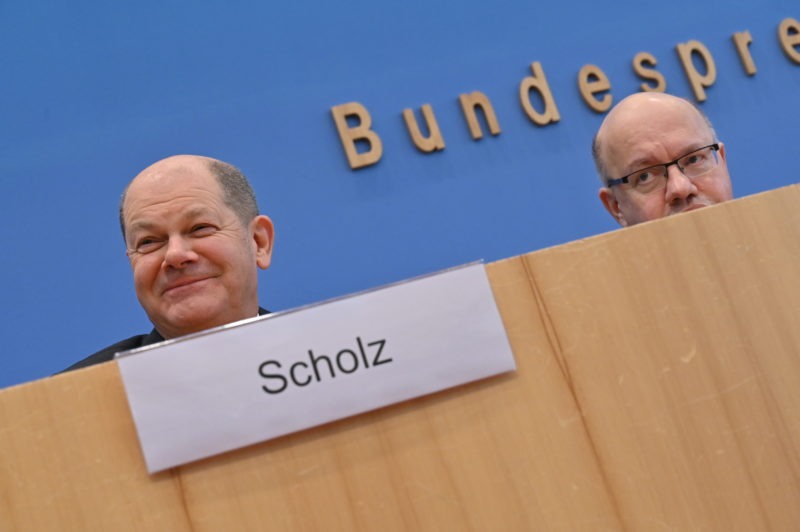Germany unleashes biggest post-war aid package against virus
German Finance Minister and Vice-Chancellor Olaf Scholz and Economy Minister Peter Altmaier said the massive aid package announced was only the opening salvo (John MACDOUGALL)
Berlin (AFP) – Berlin on Friday unleashed Germany’s biggest economic help package worth at least 550 billion euros to shore up its companies, offering them “unlimited” credit to keep their businesses afloat.
“There is no upper limit to the credit offered by (state-owned development bank) KfW, that’s the most important message,” said Finance Minister Olaf Scholz.
The guarantees, the equivalent of $614 billion, were just “for starters”, said Economy Minister Peter Altmaier.
“We promised that we will not fail because of a lack of money and political will. This means that no healthy company, no job should find themselves in trouble,” he said.
“We will reload our weapons if necessary,” added Altmaier.
The ministers also signalled that Berlin has enough funds in its treasury for a long battle.
“If it lasts longer, we can go on longer,” said Scholz.
The message to companies is that: “You can be courageous, the risks will be carried by us,” he said.
The package, even in its first stage, is bigger than the 500 billion-euro help offered by the German government during the 2008 financial crisis.
Chancellor Angela Merkel had on Wednesday vowed to do what it takes to tame the coronavirus crisis, signalling she was even ready to suspend the cherished dogma of keeping Germany’s budget balanced.
“It is an extraordinary situation, we will do what’s necessary and luckily Germany is relatively robust… we will do what we can to get through this situation well, and we will see at the end of that where our budget stands,” she said, stressing that ending the virus crisis “comes first”.
– ‘Whatever it takes’ –
After six deaths and the number of infections reaching 2,369 in Germany, Merkel’s government has been ramping up its response to fight not only the virus but also the impact of the contagion.
With demand from abroad collapsing, Europe’s biggest economy’s vital export industries are particularly vulnerable.
With the crisis showing no signs of abating for now, Germany is rushing through new regulations to allow more employees forced into shorter working hours to qualify for compensation.
Merkel’s government had also already agreed to boost investments by 3.1 billion euros per year between 2021 and 2024.
The total hike in investments totalling 12.4 billion euros will be entirely funded by 2019’s budget surplus, the coalition had announced on Monday after overnight talks.
Deka Bank chief economist Ulrich Kater said Friday’s guarantee package is a “whatever it takes from the government”.
“Like how the ECB acted correctly during the eurozone crisis, the government is now doing the same in the coronacrisis,” he noted, saying that the measures to help particularly small and medium-sized companies through the crisis are “absolutely sensible”
“This is just the news that can stop the downward spiral.”
Disclaimer: Validity of the above story is for 7 Days from original date of publishing. Source: AFP.


